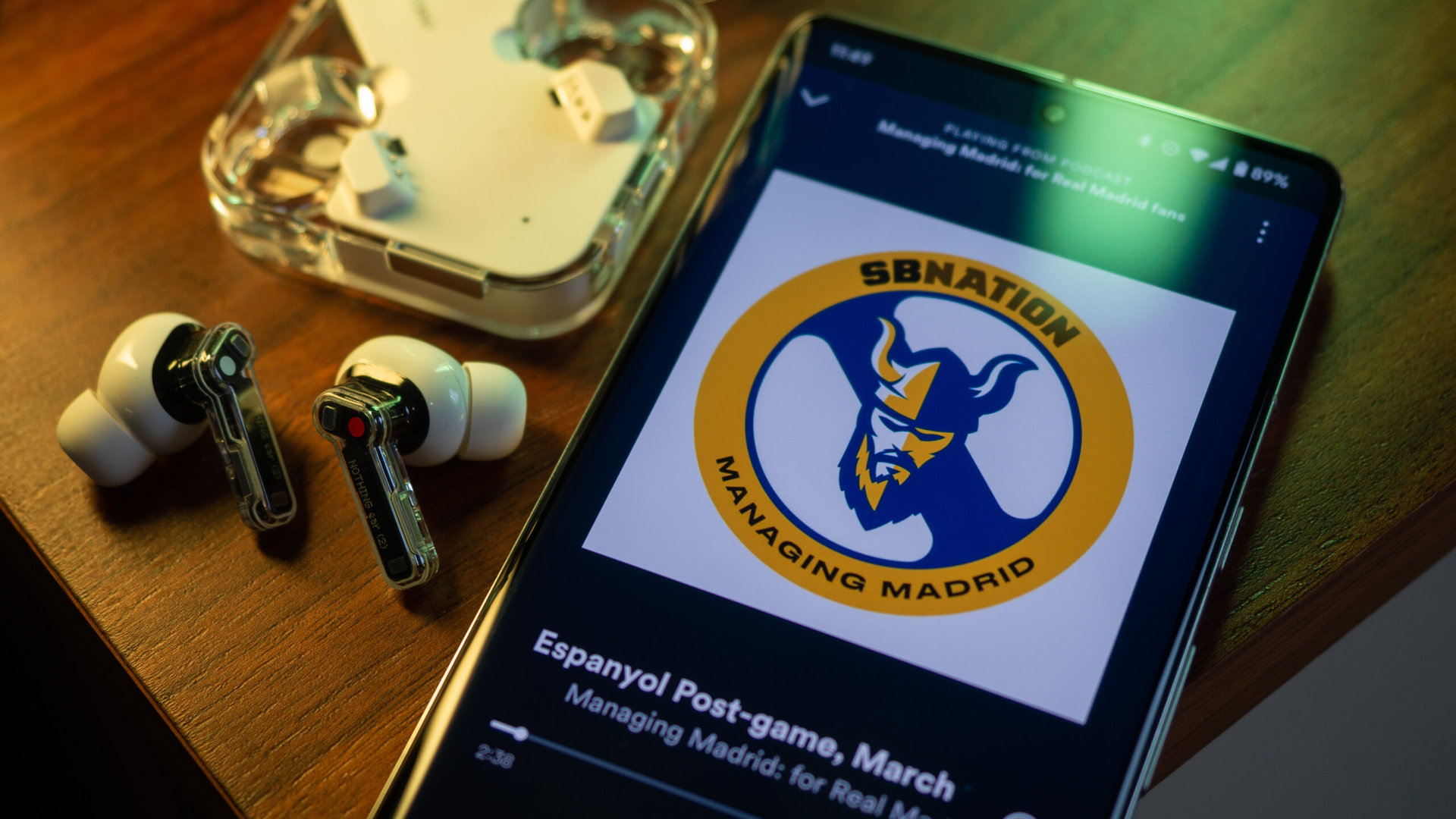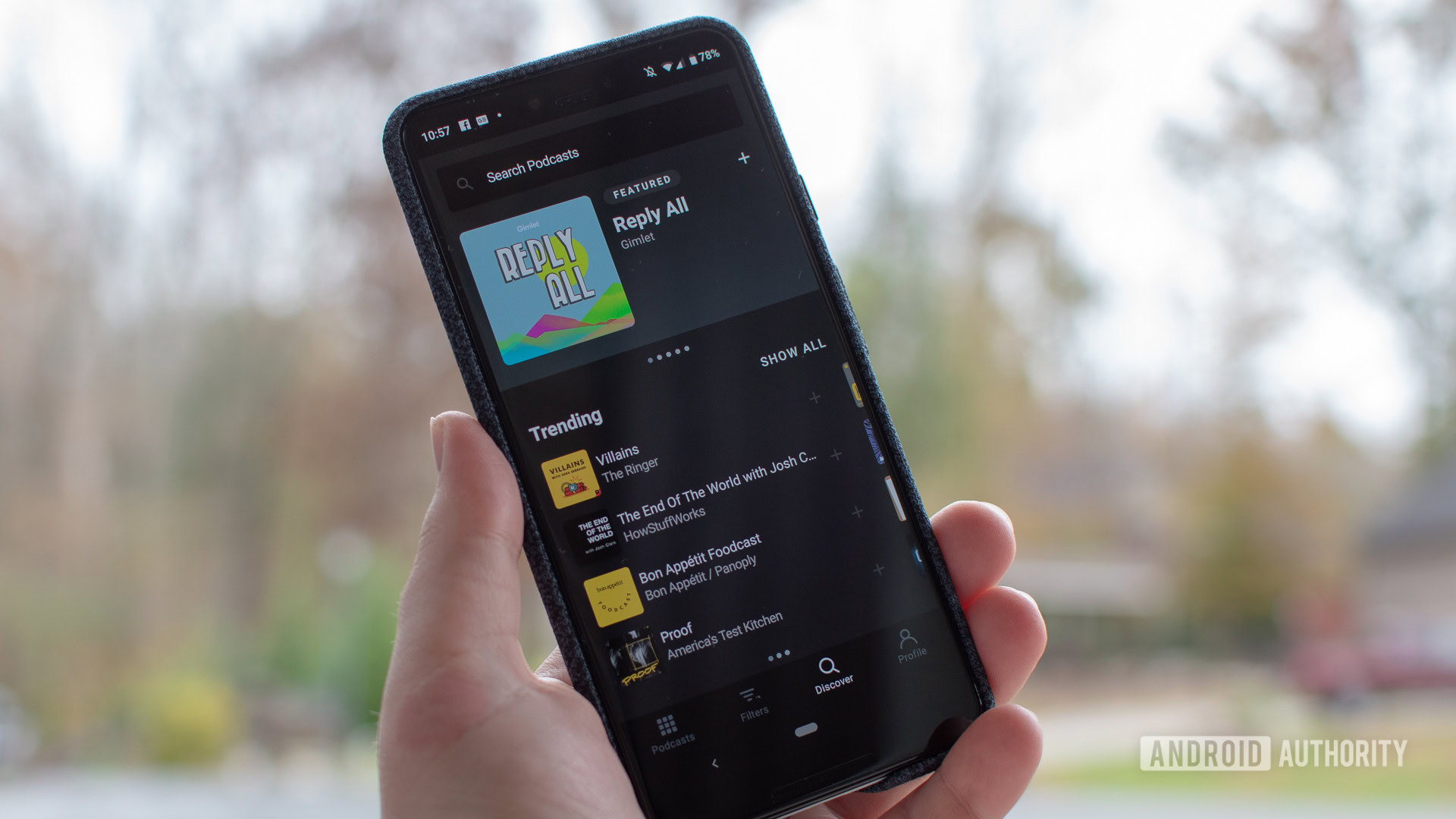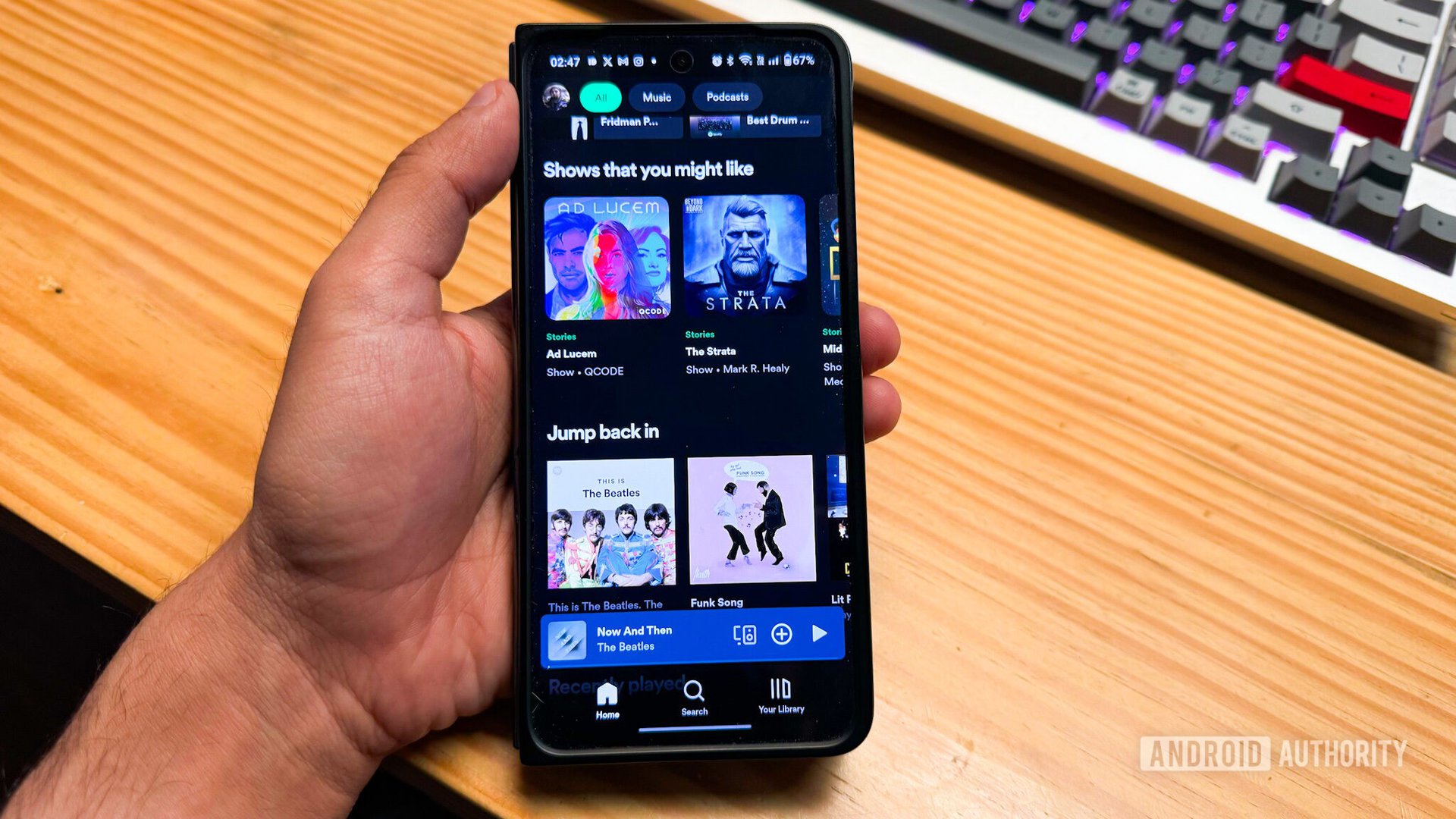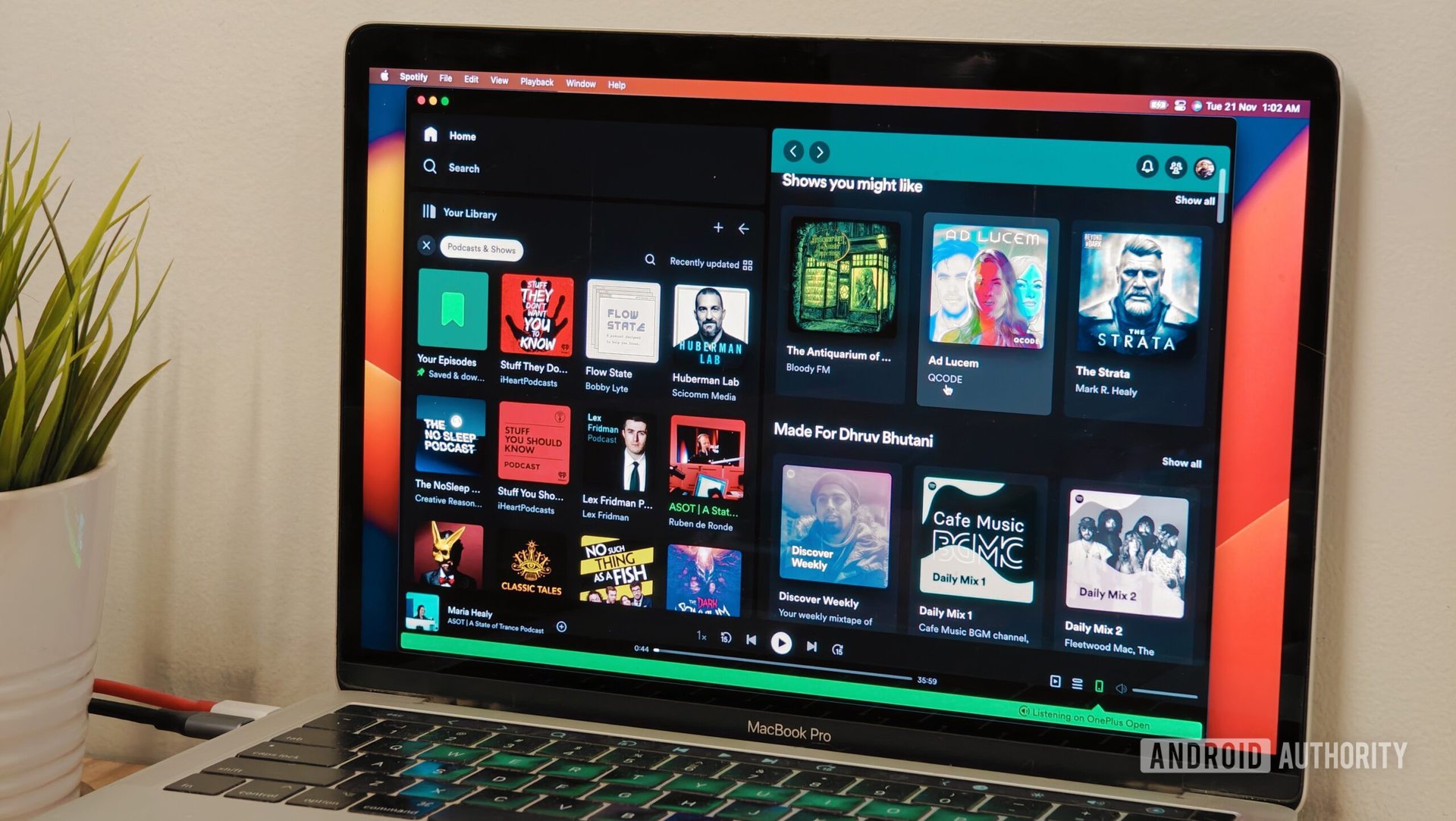Affiliate links on Android Authority may earn us a commission. Learn more.
This is why I moved from Google Podcasts and PocketCasts to Spotify
November 25, 2023

I was an early adopter of podcasts, and some of my earliest subscriptions go way back to 2005, when I got my first iPod. While my love affair with iTunes and iPods continued much longer, I switched to Pocket Casts on Android somewhere around 2012. The ability to grab podcasts on the go, easily find new shows, store them offline, or stream them over Wi-Fi — it was all a no-brainer. It helped that the app avoided feature creep while adding all the essentials like jumping forward or back or skipping silent sections, which earned it a lot of love in the Android community and a spot on our 15 best Android apps list.
Pocket Casts was my constant companion throughout university and my long daily commute. Fast forward a couple of years, though, and I started gravitating towards Google Podcasts as my podcast client of choice. My usage patterns had shifted; I was spending a lot more time on my desk, and I needed a podcast client that had an easy-to-use, non-paywalled web client. Unfortunately, like all good things at Google, the company recently announced that the app is on death row and will be deprecated early next year.

Now, I could’ve gone back to Pocket Casts, but the app’s lack of effort towards creating a compelling integration with Alexa commands has given me pause. Moreover, I wasn’t interested in paying for yet another subscription. Pocket Casts locks basics like folder management and a web client behind a subscription, making it a no-go for me.
Given the circumstances, I’ve been giving Spotify a fair shake as a podcast client. A couple of weeks after switching to Spotify, I’m sold. Despite being an early denier of the company’s shift towards podcasts and vehemently opposed to Spotify cluttering up an already busy interface, it’s clear that the app and its excellent connected feature set — and ubiquity — are most conducive to my style of everyday listening.
Podcasts for a Modern Era

Let me pre-phase this by saying that as good as Spotify is, it’s neither the best-sounding music streaming service nor does it have the best interface. Honestly, I’d say that even the quality of recommendations isn’t quite as good as it used to be. But for me, the biggest reason to stick to Spotify is Spotify Connect. The company’s near-ubiquitous streaming end-point is supported by practically every connected speaker or DIY solution. At home, I’ve got a mix of Alexa, Google, and Klipsch speakers, and the ability to jump between my speakers of choice is a must-have.
The ability to start a podcast on my bedroom speakers, continue on the kitchen Alexa, and wrap up listening in the study is Spotify's biggest asset.
Even more than music, that ability to bounce off audio wherever I want is critical for me when it comes to podcasts. My day usually starts with listening to news podcasts while I go through my morning routine and shower. I’ll then switch over the audio to the Echo Show in my kitchen while preparing breakfast and switch over to music podcasts or my favorite Flow State episodes in my home office. No other podcast app can achieve this cross-platform miracle.
Sure, it’s not as big an issue if you’re all invested in a single ecosystem of speakers, like those powered by the Chromecast protocol. Pocket Casts can handle those fine. However, I’d wager some people didn’t necessarily invest in one ecosystem, or didn’t think of interoperability when buying their different speakers. Additionally, if you are an Echo aficionado, Amazon’s insistence on sticking to skills instead of opening up Alexa Cast guarantees a borderline unusable experience. I’ve tried multiple times to invoke the Pocket Casts skill using voice commands, but it’s a rare occasion when it plays the correct podcast. I cannot start my day with a frustrating experience like that. Spotify, on the other hand, is consistently seamless.
Spotify is consistently seamless.
The ubiquitous access goes beyond being able to cast my music everywhere or the presence of a freely available desktop client. All too often, I’ll plug in my earphones and start listening to a Spotify podcast on my phone. When I sit at my desk, the Spotify app on my Mac knows precisely what’s playing on my phone and lets me control playback, rewind, or scrub forward through slower sections without lifting or unlocking my phone. That’s even better than accessing my podcasts through a browser window. Though, of course, Spotify makes that available too. The convenient ubiquity can’t be beaten.
AI-generated transcripts are another feature I’ve enjoyed a lot. Listening to dense programming or language learning podcasts, I like being able to scroll through the transcript to see precisely what was being said. Similarly, podcast chapters are yet another convenience that allows me to get straight to the meat of an interview or a comedy sketch.

While I had my concerns about Spotify stuffing podcasts into the main home page, it’s clear that the company has been listening to feedback. Outside of a single row mentioning new shows I might enjoy, Spotify has taken a step back from cluttering the home page, and I’m here for it. Adding a quick switch tab for music and podcasts right at the top has also vastly aided in keeping the two mediums separate.
Conveniences like streaming a new album after listening to a podcast review, from a single interface, can't be overstated.
I’d go as far as saying that my podcast listening has gotten a boost thanks to the quick and easy access. The reduced friction ensures that when I’m bored of listening to my classic favorite metal track, I can pop over into the podcast tab, listen to some album reviews, and quickly add them to my library for a listen right then or later. That lack of friction goes a long way toward cementing Spotify as my go-to audio media destination. The convergence between music and podcasts that I vehemently opposed earlier has turned into an unmissable convenience. It’s been a tremendous factor in shifting me to Spotify as my podcast app of choice.
Spotify isn’t ready for hardcore podcast listeners just yet

But for how far Spotify has come as a podcast client, it still has a long way to go before I can wholeheartedly recommend it as a Pocket Casts or Google Podcasts replacement for true enthusiasts. The app’s podcast organization features are minimal to the point of being non-existent. I’d love the ability to use folders to segregate genre-based podcasts, but that’s not an option. Nor can you make podcast playlists — a feature I sorely miss from Pocket Casts.
Using Spotify as a podcast client also comes with the problem of getting locked into a closed ecosystem. I can freely switch between Pocket Casts, AntennaPod, and a dozen other podcast clients in my search for a new home, thanks to the standardized use of OPML feeds, but Spotify doesn’t support that. You can neither import nor export subscriptions. This means you’ll be adding in all your new subscriptions manually in case you decide to switch. Me? I took it as an excellent opportunity to cull my overzealous podcast subscription list.
Spotify will not please hardcore enthusiasts due its lack of support for OPML imports, or essentials like trimming silence.
Additionally, while Spotify has come a long way with new features like sleep timers and speed controls in podcasts, I’d still like to see the option to trim silence or boost voices. Or even just easier segregation of podcasts that I’m already listening to or have not heard. Given the company’s serious focus on podcasts as a medium for growth over the next few years, I’m optimistic that it will make those additions sooner rather than later. But for now, it’s not quite there yet.
All in all, Spotify hardly ranks at the top as the podcast player of choice for enthusiasts, and I get it. Purpose-built clients often have a feature set that is specifically tuned to improve the experience. However, for my personal use case, Spotify has quickly become a new home. It’s not perfect yet, but Spotify-exclusive features like seamless access across platforms and the unmatched capabilities of Connect make it a no-brainer.
Yes, podcasts are free on Spotify for all listeners. However, features like ad-free listening, and offline playback are restricted to just Spotify Premium subscribers.
In general, Spotify does not pay podcasters. However, the service offers tools to integrate ads or create paywall-locked content for podcasters that can help them earn money.
Yes, you can download podcasts for offline listening on Spotify. Additionally, it is possible to set individual podcasts to automatically download every time there is a fresh episode.
Yes, Spotify supports video podcasts. When played in the mobile app, video podcasts will automatically switch to audio-only streaming when played in the background. It is also possible to set video podcasts to only stream the audio.
Thank you for being part of our community. Read our Comment Policy before posting.